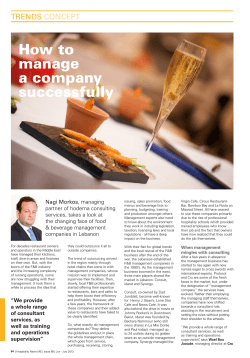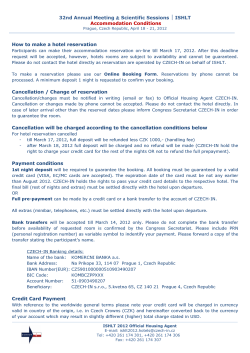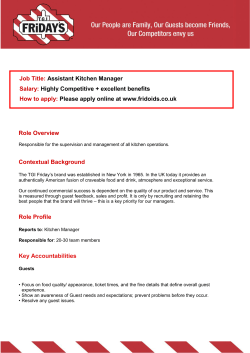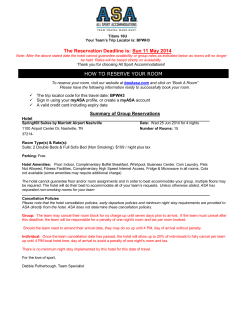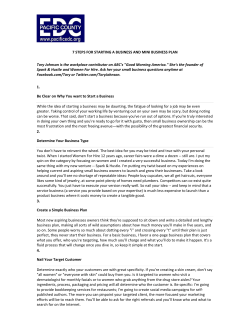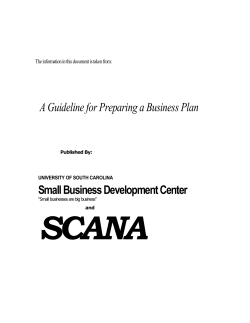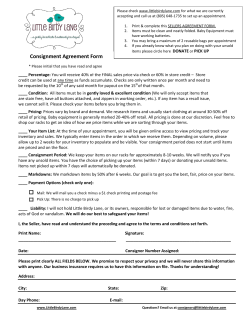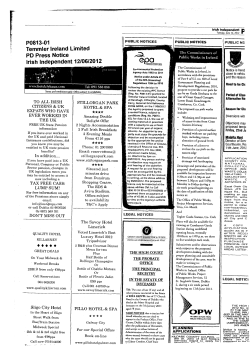
Personalization and Pricing: How to Drive Profitability in
Personalization and Pricing: How to Drive Profitability in Web-based Booking Engines | By Kelly McGuire Search... HOME NEW S OPINIO N PERFORMANC E HO T BRAND S PEOPL E PRODUCT S EVENT S PHOTO S Search SCHOOL S BOOK S 36 0 Cookies on Hospitality Net CLOSE We use cookies to ensure that we give you the best experience on our website. If you continue to browse the site, we'll assume that you are happy to receive cookies on the Hospitality Net website. To find out more about the cookies we use click here. Global Asia Pacific Caribbean Europe Central & South America Middle East & Africa USA & Canada Set your edition Home / Column / Personalization and Pricing: How to Drive Profitability in Web-based Booking Engines | By Kelly McGuire INDUSTRY NEWS Share on 4 April 2014 Personalization and Pricing: How to Drive Profitability in Web-based Booking Engines By Kelly McGuire The InterContinental Hotel Group recently conducted a global advertisements SAS Institute Inc. 100 SAS Campus Drive Cary, NC 27513-2414 United States Phone: (919) 677-8000 Fax: (919) 677-4444 Visit Website survey of their hotel guests, and came to the following conclusion, as expressed by their CEO: "Hotel brands have traditionally concentrated on being 2D – how to be both global and local. But 0 Comments our research shows that the rise of personalization means brands must be 3D [personalized, local, global] in order to build both trust Author Details and lasting relationships with guests and to win in a highly competitive global market," (Richard Solomons, CEO, IHG). In a highly competitive and increasingly commoditized environment, many hoteliers feel that delivering a more personalized guest experience will be the differentiator, and Organization Details Subscribe to Newsletter CONTACT recent research backs up this claim. With more guest data available than ever before, and the emerging technologies to capture, comprehend and act on that data, this vision is coming close to reality. The hotel company that is able to turn all of the data about guests and operations into improvements in the guest experience will win. Revenue Angela Lipscomb Phone: 919-531-2525 Send Email Post your News Advertising Information management and pricing has a key role in this initiative, ensuring that personalization is delivered profitably. What is Personalization, Exactly? As always, with any term that is coming dangerously close to a buzz word, understanding what is meant by personalization is an important first step to delivering MORE FROM KELLY MCGUIRE Hotel Yearbook: 14 recommendations for hotels in 2014 | By Kelly McGuire on it. The dictionary defines personalize as: "to design or tailor to meet an individual's specifications, needs or preferences". Translating this into a technology environment, I 20 February 2014 found this definition to be particularly useful: "Personalization technology enables the The 14 actions for hotels in 2014 | By Kelly McGuire dynamic insertion, customization or suggestion of content in any format that is relevant to the individual user, based on the user's implicit behavior and preference, and explicitly given details." (attributed to James Dorman in Quora). If we interpret both of these definitions in the hotel context, I see two opportunities, both equally important. First, following the technology definition, hotels should find opportunities within the guest lifecycle to deliver content, recommendations or experiences that match the guest's expressed (or inferred) needs and preferences. advertisements 17 January 2014 Pricing in a Social World: How consumers use ratings, reviews and price when choosing a hotel | By Kelly McGuire 25 October 2013 This isn't a "new" idea – frankly, it's really just good service – but with technology enablers, we can infuse personalization into every interaction, and standardize delivery across touch-points, whether through a personal interaction, or with technology (i.e. website). For example, the front desk agent could recommend an upgrade or a restaurant reservation based on the guest's previous stay patterns – even if it was to a different hotel in the chain. When a guest is browsing on the website, the content they see could be customized to their search patterns (Caribbean properties if they are searching for resorts, pictures of F&B as they explore dining options). The second important aspect of personalization, following the first definition, is allowing the guest to customize their own experience, effectively giving them control over certain key aspects – attributes of the room, on-property activities or local experiences. This could come in the form of packages that can be entirely customized by the guest, or being able to select from amenities in the room or dining options on property. In either case, it will be crucial to track the actions and the results http://www.hospitalitynet.org/news/4064734.html[7/24/2014 3:44:03 PM] MOST VIEWED Last Day Last 7 Days Last 30 Days Formula for Running a Successful Hotel - A case study - Part 1 – the Heart of the Matter | By L. Aruna Dhir 17 Things I Hate About Guestrooms | By Larry Mogelonsky Personalization and Pricing: How to Drive Profitability in Web-based Booking Engines | By Kelly McGuire over time, so that profiles can be updated, recommendations improved and the program can continuously evolve. How Does Pricing Fit In? Cornell's Pillsbury Institute Wins Coleman Foundation Entrepreneurship Fellows Program Grant Revenue management will play an important role in the planning and execution of personalization initiatives. In the constant struggle to balance providing an excellent guest experience with driving revenue and profits, revenue management's role is to ensure that personalization efforts are driving enough of the right kind of revenue to ensure they are profitable and sustainable. This will have to be done in partnership with marketing and operations, of course. Pricing recommendations will be a key component of the personalized offers and recommendations that go to the guest. [Infographic] Technology and the Cycle of Influence HotStats UK Chain Hotels Market Review – June 2014 Many think that personalization goes hand in hand with revenue management's long term vision of "customer-centric revenue management", and until we can deliver on customer-centric pricing, we cannot achieve personalization. Depending on how you define "customer-centric revenue management" this could be more or less true. Some would say that customer-centric revenue management is about calculating the lifetime value of a customer, building that into the optimization algorithm, and advertisements then either restricting access or delivering a specific price based on that individual customer's lifetime value. In my view, the role of price in personalization does not have to go this far to be successful. There is a spectrum of possibilities, all of which will be effective in driving revenue and improving the guest experience. In fact, pricing can become more customer-centric even without changing the core revenue management analytic process. Consider the following scenarios: A guest searches the website for resort properties, and you know that when they have vacationed with you in the past, they've booked suites. When they click check availability, personalization technology kicks in and the suites are displayed first. If the price of the suites is the optimal price for that product, based on the revenue management systems recommendations, then revenue management has participated in the personalization process without needing to know anything about the customer, the offer or the content. The same goes for the case in which a guest that was browsing a website, but did not book, receives an email offer for the product they were searching for a couple of days later. If the price is based on a revenue management system recommendation, pricing is part of the personalization process without changing the existing revenue management process. The possible exception in both cases, is that if you move to selling by room type, a revenue management system that can give optimal price recommendations at a room type level will provide more profitable pricing recommendations. In both cases, if the guest books the offer, the booking becomes part of the data that the revenue management system consumes for future pricing calculations. As the personalization capabilities become more complex, the challenges on revenue management increase. Allowing guests control over their experience might include providing a personalized package, where they pick the elements and are given a price based on their selections (which would require accurate estimates of the value of each of the packaged elements, in addition to the value of them as a package – basically a giant forecasting and optimization problem). Personalized price at the individual level, based on a balance between customer lifetime value (as I described above) and the forecasted value of the product is also a possibility. In this case, the selling system would have to be set up to deliver a recommendation in real time based on analytics about the specific customer that is booking, as well as the available inventory and expected demand to come. It requires more analytics, technology and integration, but is certainly achievable, should you wish to manage demand at this level. Regardless of how revenue management contributes, whether systematic (where the revenue management algorithms are part of the process), or more ad hoc, where revenue management provides analysis and support for personalization initiatives to help justify their demand or revenue impacts, revenue management needs to have a seat at the table. Personalization will require the involvement of all functions across the organization to be successful. How Do We Get Started? Clearly a personalization strategy is not one that can happen overnight. It will require an investment in resources, technology and internal processes. However, there are some things that hotels could do right now to begin to organize towards the eventual vision of personalization. Here are five tips to consider taking on this year that will start moving the organization in the right direction. 1. Leverage Your Mobile Presence Consumers are turning to mobile for everything from research, to transactions to logistics support. Hotels must provide value through their mobile app, or risk losing consumers who prefer the integrated mobile experience they can get from a third party, like an online travel agent. Think creatively with your counterparts about how to set yourself apart with your mobile presence. 2. Understand How Your Website is Performing As competition heats up for the online consumer – between third party distribution channels and meta-search (and so on, and so on), how does your website stack up? Is it easy for consumers to find? To navigate? Does if effectively represent your brand? Does it show up in search? If you are not where your customers are, you'll miss out on the opportunity for them to come directly to you. If they can't find what they are looking for on your website, they'll go to a third party – or to your competitor. 3. Evaluate the Cross-Channel Experience Everyone has multiple devices these days, and your guests are no exception. Consumers will look for you through a myriad of devices (mobile, tablet, laptop), and a myriad of channels (website, Facebook). Are you delivering a consistent experience through all of these channels? Is the look and feel the same (adjusting for channel demographics etc., of course)? Are they recognized through all channels? Can they find the same product or services no matter where they look? Put yourself in your guest's shoes, and be critical of what you are seeing. http://www.hospitalitynet.org/news/4064734.html[7/24/2014 3:44:03 PM] advertisements Personalization and Pricing: How to Drive Profitability in Web-based Booking Engines | By Kelly McGuire 4. Simplify the Booking Process As an industry, we need to be sure that we are making it as easy as possible for our guests to do business with us. (And holding booking engine providers accountable for ensuring that the booking process if as efficient for the customer as possible!) Looking at it from the guest's perspective, booking a room today can be very confusing and difficult. Booking links are buried on brand.com, so they are nearly impossible to find. Search parameters are confusing, and information has to be entered multiple times. Guests are presented with long lists of room pricing and packages (nearly always starting with the cheapest), many of which they don't qualify for. It is difficult to enter or search for options (room type, special packages). The easier the booking process, the more likely the guest will be to complete their transaction, and use your site next time as well. 5. Start Operations on the Path to Personalization You can start conceptualizing what personalization will look like across the guest experience now, even if you do not yet have the tools to execute it. Start identifying interaction points where personalized recommendations can be offered. Conceptualize a website flow with personalized content. Identify portions of your service process that could be "customized" by a guest. Decide what information you want to access about the guests, and how you want to use it. (Will guests appreciate you printing out a picture from their Facebook page for next to the bed, or will they find that intrusive and "creepy"? Do you want to offer the exact same drink to a guest when they approach the hotel bar, no matter where they are, or just be sure you have their brand behind the bar "just in case"?). Figure out how you would get personalized recommendations in the hands of your team members, and how you would like to have them interpret and act on those recommendations. These actions will help to guide your technology, data and analytics strategies, as well as setting a plan for the change management required to execute. You will notice that not all of these activities are under the direct control of revenue management. Some of these will have to be managed through influence with the other departments across the hotel. Personalization is an all-encompassing initiative, however, representing a change to core facets of the operation. Because of this, it is crucial that all departments have a voice in the process, and visibility to the initiatives. After all, if moving in this direction does not generate revenue and profits, what's the point? KELLY MCGUIRE Kelly McGuire leads the Hospitality and Travel Global Practice for SAS. In this role, she is responsible for driving the offering set and setting strategic direction for the practice. McGuire works with product management, sales, alliances and R&D to ensure that SAS solutions meet the needs of the market. She also works closely with IDeaS Revenue Solutions, a SAS company, helping to integrate IDeaS revenue management solution with SAS’ Customer Intelligence solutions. She has 20 years of experience in the hospitality industry. Before joining SAS, McGuire consulted with Harrah’s Entertainment on restaurant revenue management strategies for their major markets. Prior to that, she was a senior consultant at Radiant Systems. She also worked for RMS (Restaurant Revenue Management Solutions) providing menu item pricing recommendations to major chain restaurants. McGuire has a BS from Georgetown University and a MMH and PhD in Revenue Management from the Cornell School of Hotel Administration. Her research has been published in The Cornell Hospitality Quarterly, Journal of Pricing and Revenue Management and the Journal of Service Management. view all of Kelly's columns ABOUT SAS SAS is the leader in business analytics software and services, and the largest independent vendor in the business intelligence market. Through innovative solutions, SAS helps customers at more than 65,000 sites improve performance and deliver value by making better decisions faster. Since 1976 SAS has been giving customers around the world THE POWER TO KNOW®. SAS and all other SAS Institute Inc. product or service names are registered trademarks or trademarks of SAS Institute Inc. in the USA and other countries. ® indicates USA registration. Other brand and product names are trademarks of their respective companies. Copyright © 2013 SAS Institute Inc. All rights reserved. USA & Canada Revenue Management CRM & Loyalty Internet Marketing COMMENTS http://www.hospitalitynet.org/news/4064734.html[7/24/2014 3:44:03 PM] Personalization and Pricing: How to Drive Profitability in Web-based Booking Engines | By Kelly McGuire LATEST NEWS IN THIS CATEGORY Life After Free WIFI | By Jason Jefferys 4 hours ago 49 Hotels Select CheckMate for Online and Mobile Check-In 5 hours ago Global Online Hotel Bookings and Rates Experience Highest Year-on-year Growth in Last 12 Months 5 hours ago Sertifi and Newmarket to Co-Host eSignatures and PCI Compliance Webinar 6 hours ago FCS Bolsters Valued Business Partners Roster with addition of IT Solutions Provider Piramid Solutions Co., Ltd. in Thailand 6 hours ago Starwood Hotels & Resorts to Launch Dual-Branded Aloft and Element Hotel Development in Columbus, Ohio 7 hours ago Hotels, If You Advertise Free WiFi, Please Make Sure The WiFi's Free | hotelchatter.com 7 hours ago M&R Hotel Management Names Manager for Staten Island Hotel 8 hours ago Guestline’s strategic partnership with JLL improves hotel profits and processes 9 hours ago Vizergy® Client Websites Increase Engagement, Conversions and Direct Revenue All News HOSPITALITY NET Homepage Contact Post Content Advertising Hospitality Net on Facebook Hospitality Net on Twitter Hospitality Net RSS NEWSLETTER Hospitality Net 360 INDUSTRY NEWS All News Real Estate & Investment Hotel Openings Social Media Revenue Management Food & Beverage Innovation Education & Learning Technology Supplier News PERFORMANCE Industry Performance OPINION Columns All Columnists Blogs HOT TOPICS Airbnb a Threat? Guest Satisfaction Visioning 2014 SCHOOLS Hotelschools & Universities HOT SPOTS China Dubai Hong Kong India London New York Paris BRANDS Hotel Brands Management Companies Franchise Companies Investment Companies Voluntary Chains Industry Associations ©1995-2014 Hospitality Net™ All rights reserved. http://www.hospitalitynet.org/news/4064734.html[7/24/2014 3:44:03 PM] PEOPLE Staff Movements PRODUCTS Product Features Vendors & Suppliers PHOTOS Photos Social Photos Historic Photos Charts Infographics Videos BOOKS Books Hospitality Net is powered by Hsyndicate EVENTS All Upcoming Events Academic & HR Associations Events Design Digital Marketing Finance & Investment Food & Beverage MICE Revenue Management Technology Webinars
© Copyright 2025

